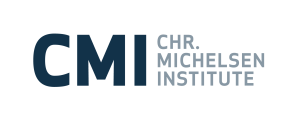CMI is an independent, applied development research institute located in Bergen, Norway. Its staff generate and communicate research-based knowledge relevant to combating poverty, advancing human rights, reducing conflict and promoting sustainable social development. Staff members have long-standing experience in the evaluation and review of development projects and programme.
The CMI focuses on local and global challenges and opportunities facing low- and middle-income countries and their citizens. Our geographic orientation is towards Africa, Asia, the Middle East, Latin America, and to some extent the Balkans. The CMI employs some 50 social scientists—predominantly economists, social anthropologists, and political scientists. Most CMI researchers have substantial experience from operational work in developing countries and international organisations. The institute maintains an extensive network of international contacts and has formal co-operation agreements with several research institutions in Southern and Eastern Africa, South Asia and the Middle East. Clients include research councils, donor agencies, the United Nations, the World Bank, and civil society organisations.
Roles/tasks in the project
CMI is a major contributing partner and lead of many tasks in the TRAFIG consortium. In this position, CMI is responsible for major contributions to all aspects of studies related to the Middle East and especially Syrian refugees. Most notably, CMI is leading WP 5 “Investigating transnational figurations of displacement in the Middle East” and is participating in nearly all components of the project.
Team members involved in the project
Sarah A Tobin
Sarah A Tobin holds a PhD in Anthropology from Boston University (2011). Her work explores transformations in religious and economic life, identity construction and personal piety. She also examines the intersections with gender, Islamic authority and normative Islam, public ethics and Islamic authenticity. Ethnographically, her work has focused to a large degree on Islamic piety in the economy, especially Islamic banking and finance and in conditions of displacement. Sarah also explores these questions in times of economic shifts, such as during Ramadan, in contested fields of consumption such as the hijab, and the Arab Spring. Her latest research projects examine these questions with Syrian refugees in Jordanian camps of Za`atari, Azraq, and Cyber City, and in results-based financing in Tanzania. Sarah’s recent books are Everyday Piety: Islam and Economy in Jordan (Cornell University Press, 2016) and The Politics of the Headscarf in the United States (Cornell University Press 2018), with Bozena C. Welborne, Aubrey L. Westfall, Ozge Celik-Russell). Sarah has been one of the first researchers able to gain access to Za‘atari camp (in January 2014) and one of the few researchers granted access to Cyber City camp. She has a longstanding and positive relationship with the Jordanian government and the Syrian Refugees Affairs Directorate (SRAD), as well as UNHCR and the various NGOs involved in assisting the refugees.
Are John Knudsen
Are John Knudsen is Senior Researcher at the Chr. Michelsen Institute (CMI) and holds a PhD in social anthropology from the University of Bergen (2001). Are Knudsen was Research Director at CMI (2006–09, 2013–15), project manager for institutional research collaboration in Palestine (2005–13) and co-director of an institute programme on forced migration (2009–13). Are Knudsen has done fieldwork in Afghanistan, Lebanon, Pakistan and Palestine and specialises in micro-conflict, forced displacement and urban refugees and has an extensive publication record on these topics. His current research under the French BABELS project studies urban refugees in Beirut and the spatial convergence of the Palestinian and Syrian refugee crises. Are Knudsen has led several Research Council of Norway (RCN) projects, field evaluations in Afghanistan, Pakistan and Palestine (commissioned by MFA & NORAD) and completed long-term fieldwork and short-term assignments in conflict zones.
